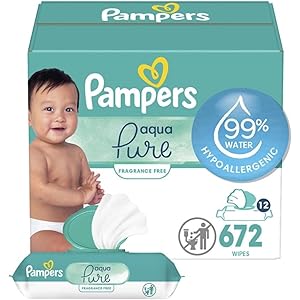Pampers Baby Wipes Aqua Pure, 99% water-based wipes, Hypoallergenic and Unscented Baby Wipes, 672 Wipes Total (12 Flip-Top Packs)
$34.37 (as of October 25, 2025 00:05 GMT +00:00 - More infoProduct prices and availability are accurate as of the date/time indicated and are subject to change. Any price and availability information displayed on [relevant Amazon Site(s), as applicable] at the time of purchase will apply to the purchase of this product.)Understanding Prenatal Care
Prenatal care is a vital aspect of a healthy pregnancy, encompassing regular check-ups and screenings that monitor both the mother and the developing fetus. The question “When should I start prenatal care?” is crucial for expectant mothers as it sets the foundation for a healthy pregnancy journey. Early and consistent prenatal visits can help identify potential risks and ensure that both mother and baby receive the necessary medical attention.
When to Schedule Your First Appointment
Most healthcare professionals recommend that women schedule their first prenatal appointment as soon as they suspect they are pregnant, ideally around 6 to 8 weeks into the pregnancy. This early visit allows for a comprehensive evaluation of the mother’s health, including a review of medical history, lifestyle factors, and any pre-existing conditions that could affect the pregnancy. Early intervention can significantly improve outcomes for both mother and baby.
The Importance of Early Prenatal Care
Starting prenatal care early is essential for monitoring the development of the fetus and addressing any health concerns that may arise. During the initial visits, healthcare providers will conduct various tests, including blood tests and ultrasounds, to assess the baby’s growth and detect any abnormalities. Early prenatal care also provides an opportunity for mothers to receive guidance on nutrition, exercise, and prenatal vitamins, which are crucial for fetal development.
Frequency of Prenatal Visits
After the initial appointment, the frequency of prenatal visits typically follows a standard schedule: once a month until the 28th week, every two weeks from 28 to 36 weeks, and weekly from 36 weeks until delivery. This schedule allows healthcare providers to closely monitor the health of both the mother and the baby, making adjustments to care as needed. Consistent visits help ensure that any potential issues are addressed promptly.
What to Expect During Prenatal Visits
During prenatal visits, expectant mothers can expect a variety of assessments and screenings. Healthcare providers will measure weight, blood pressure, and the growth of the fetus, as well as conduct urine tests to check for signs of gestational diabetes or preeclampsia. Additionally, discussions about the mother’s emotional well-being, lifestyle choices, and any concerns she may have are integral parts of these appointments.
Signs That Indicate Immediate Prenatal Care
While the general recommendation is to start prenatal care early, certain signs may necessitate immediate medical attention. If a woman experiences severe abdominal pain, heavy bleeding, or symptoms of preterm labor, she should seek care without delay. These symptoms can indicate complications that require prompt intervention to ensure the safety of both mother and baby.
Choosing the Right Healthcare Provider
Selecting the right healthcare provider is a critical step in the prenatal care journey. Expectant mothers should consider factors such as the provider’s experience, approach to prenatal care, and compatibility with their personal preferences. Whether choosing an obstetrician, midwife, or family doctor, it is essential to feel comfortable and supported throughout the pregnancy.
Understanding Prenatal Tests and Screenings
Prenatal tests and screenings play a significant role in monitoring the health of both mother and baby. Common tests include blood tests, ultrasounds, and genetic screenings. Understanding the purpose and timing of these tests can help expectant mothers feel more prepared and informed about their pregnancy journey. Discussing any concerns with a healthcare provider can also alleviate anxiety surrounding these procedures.
Nutrition and Lifestyle During Pregnancy
Proper nutrition and a healthy lifestyle are crucial components of prenatal care. Expectant mothers should focus on a balanced diet rich in vitamins and minerals, including folic acid, iron, and calcium. Regular physical activity, as advised by a healthcare provider, can also promote overall well-being during pregnancy. Making informed choices about diet and exercise can positively impact both maternal and fetal health.
Emotional Well-being and Support
Prenatal care extends beyond physical health; emotional well-being is equally important. Pregnancy can bring about a range of emotions, and seeking support from partners, family, or professionals can help manage stress and anxiety. Healthcare providers can offer resources and referrals for counseling or support groups, ensuring that expectant mothers receive comprehensive care throughout their pregnancy journey.



